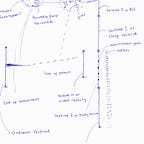Neuroscience: How Does the Brain Generate Mental Health | Consciousness?
The answer to mental health is not therapy, psychotropic meds, drugs, social-political-economic solutions, it is the brain and its agreement. It works or doesn’t as the brain accedes — for the most part.
How does the brain do it? What element is used to experience situations and conditions, whose destinations make determinations?
Thought.
Thought is an identity, version, representation or equivalent of senses to the brain. It is what is relayed and stored in memory — to know and experience.
Theoretically, thought emerges as the uniform quantity of sensory processing in the thalamus and olfactory bulb — for smell.
Memory is the next stop for thought after emergence. Memory is also where thoughts [in large/small stores] reside and transport consistently, regardless of inputs.
It is also how inputs like therapy, medications, drugs and so on adjust stores that determines wellness, side-effects and so on.
It is where and how thoughts proceed in memory that decides what to remember or subjectively feel at any moment, defining consciousness.
Mental health is an experience determined by thought and memory, preceding feelings and reactions.
Displaying thought and memory across the brain holds promise for mental care.
